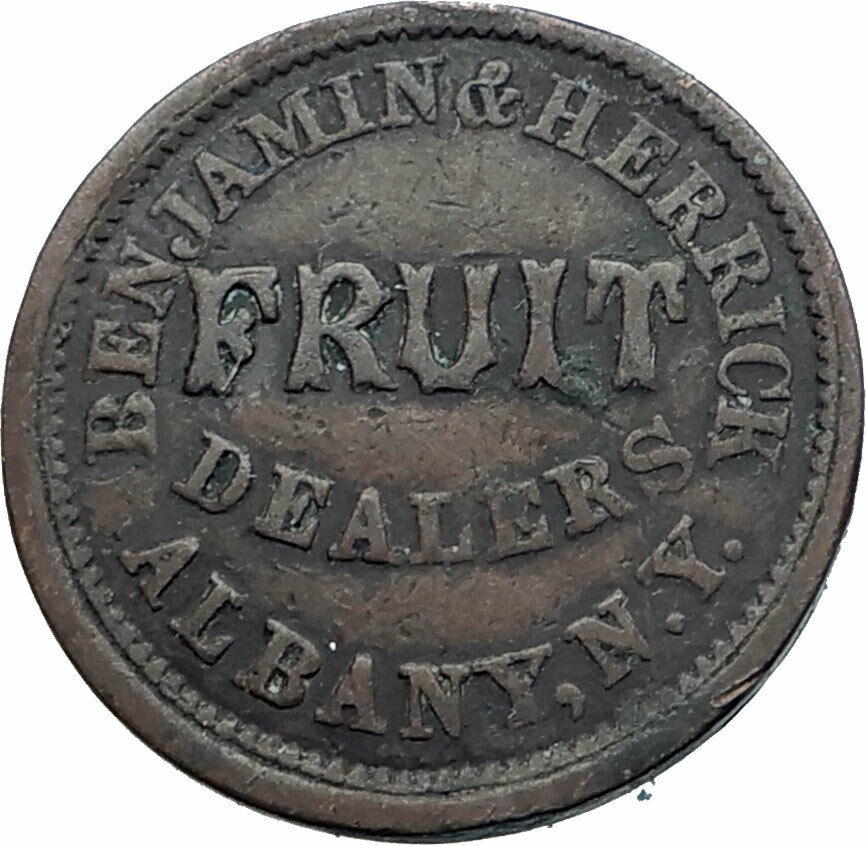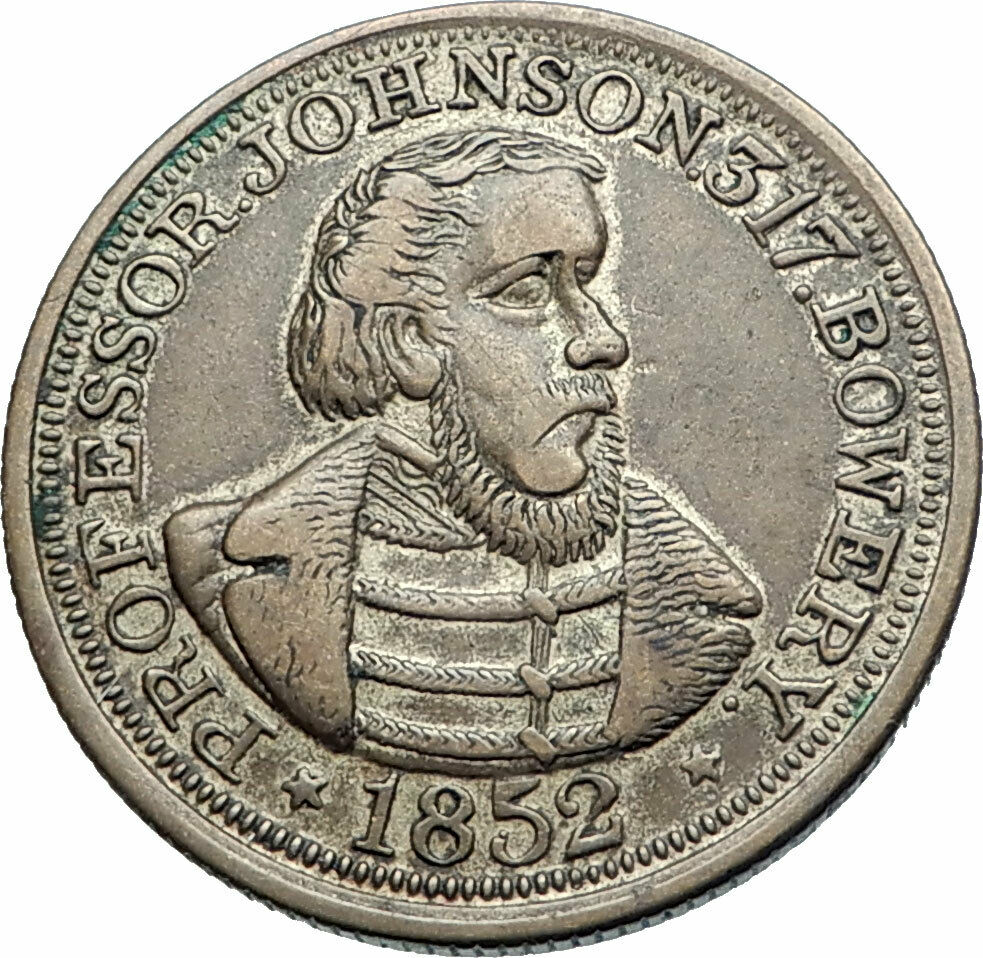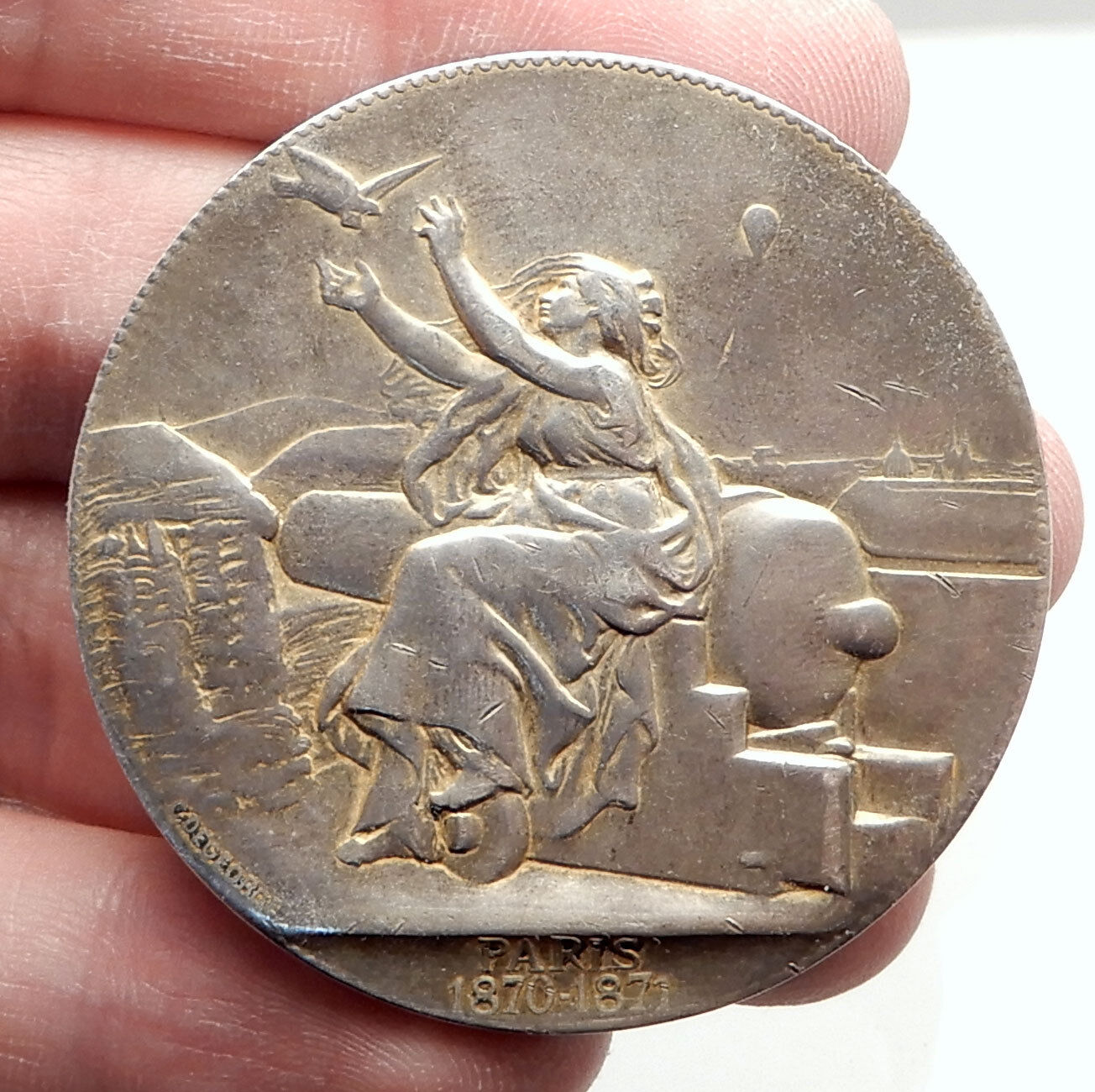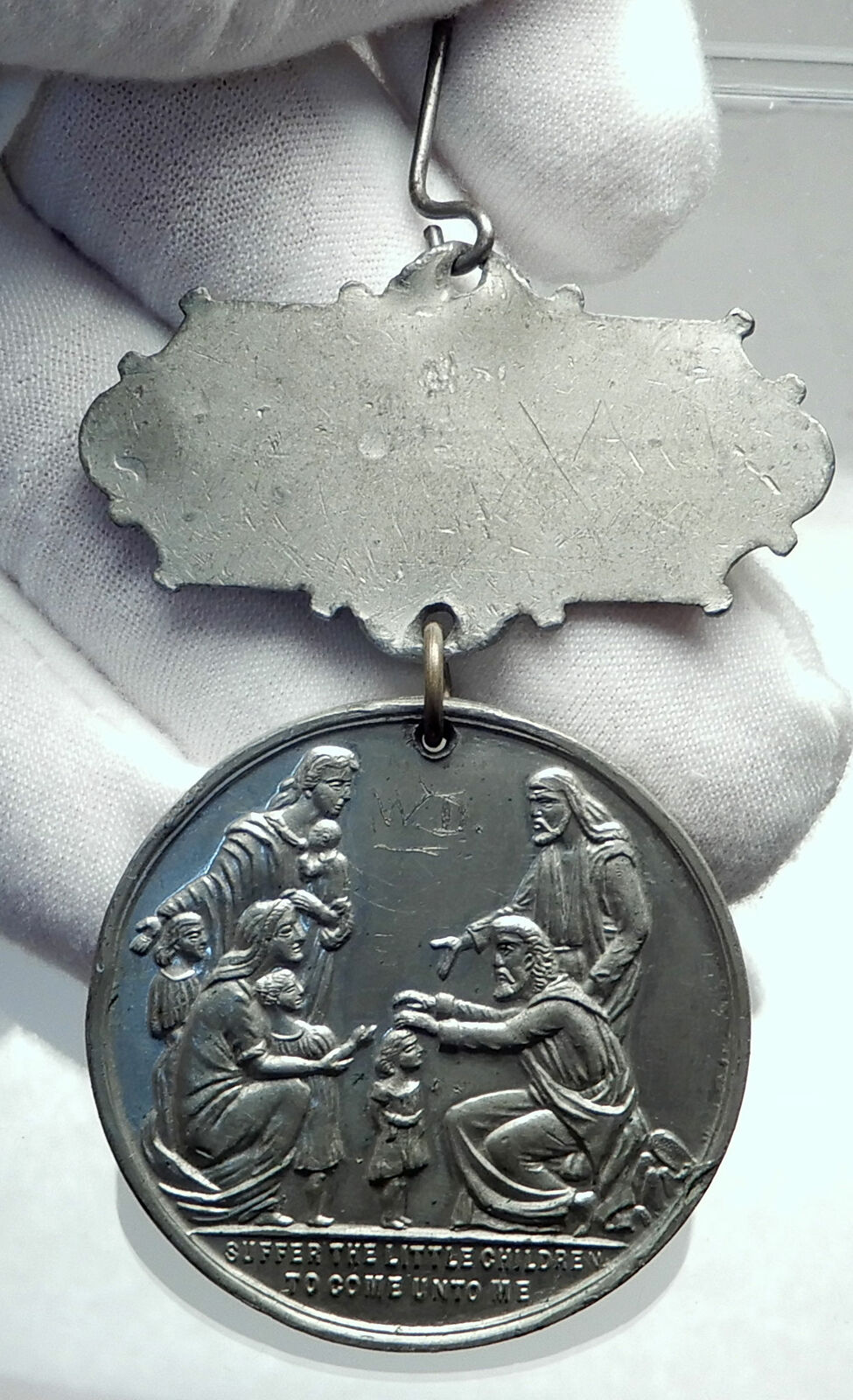|
Germany – German States. Kingdom of Prussia
Friedrich III – King of Prussia: 9 March 1888 – 15 June 1888
1888 Medal 38mm x 35mm (21.27 grams)
WILHELM II .:. FRIEDRICH III .:. WILHELM I, Three Kaisers facing right.
1888 ZUR ERINNERUNG AN DAS DREI KAISERJAHR, Eagle with necklaced shield within larger shield, crown above.
You are bidding on the exact item pictured, provided with a Certificate of Authenticity and Lifetime Guarantee of Authenticity.
 The Year of the Three Emperors, or the Year of the Three Kaisers, (German: Dreikaiserjahr) refers to the year 1888 during the German Empire in German history. The year is considered to have memorable significance because of the deaths of two German Emperors, or Kaisers, leading to a rapid succession of three monarchs within one year. The three different emperors who ruled over Germany during this year were Wilhelm I, Frederick III and Wilhelm II. The mnemonic “drei Achten, drei Kaiser” (English: “three eights, three emperors”) is still used today in Germany by children and adults alike to learn the year in question. The Year of the Three Emperors, or the Year of the Three Kaisers, (German: Dreikaiserjahr) refers to the year 1888 during the German Empire in German history. The year is considered to have memorable significance because of the deaths of two German Emperors, or Kaisers, leading to a rapid succession of three monarchs within one year. The three different emperors who ruled over Germany during this year were Wilhelm I, Frederick III and Wilhelm II. The mnemonic “drei Achten, drei Kaiser” (English: “three eights, three emperors”) is still used today in Germany by children and adults alike to learn the year in question.
Situation
 Wilhelm I had been the King of Prussia before the formation of a German Empire due largely to Bismarck’s efforts. As the monarch of the largest German state which had a key role in the unification, Emperor Wilhelm I had ruled over the German Empire ever since the unification of Germany on 18 January 1871. He lived until he was almost 91 years old and reigned over Prussia for 27 years and over Germany for 17 years. His son, Crown Prince Frederick William, was celebrated for his military actions because of his leadership during the wars fought to unify Germany.[6] Frederick commanded staffs and armies during the Second Schleswig War, the Austro-Prussian War, and the Franco-Prussian War. Crown Prince Frederick William had just turned 56 before the year 1888. Frederick also had a number of children at the time, and his heir-apparent was named Wilhelm, after his grandfather. Wilhelm turned 29 in January 1888. Wilhelm I had been the King of Prussia before the formation of a German Empire due largely to Bismarck’s efforts. As the monarch of the largest German state which had a key role in the unification, Emperor Wilhelm I had ruled over the German Empire ever since the unification of Germany on 18 January 1871. He lived until he was almost 91 years old and reigned over Prussia for 27 years and over Germany for 17 years. His son, Crown Prince Frederick William, was celebrated for his military actions because of his leadership during the wars fought to unify Germany.[6] Frederick commanded staffs and armies during the Second Schleswig War, the Austro-Prussian War, and the Franco-Prussian War. Crown Prince Frederick William had just turned 56 before the year 1888. Frederick also had a number of children at the time, and his heir-apparent was named Wilhelm, after his grandfather. Wilhelm turned 29 in January 1888.
Rapid succession
 Emperor Wilhelm I died on 9 March 1888 after his long reign. He was then succeeded by his son, Frederick William. Frederick William became known as Frederick III when he assumed the throne. Along with his military successes, Frederick III was a reputed liberal and married to the United Kingdom’s liberal Princess Royal Victoria. However, by the time of his father’s death, Frederick was 56 years old and had already developed a terminal case of cancer of the larynx before he assumed the German imperial throne. Frederick attempted to have it treated, but it was not successful. Due to this illness and subsequent treatment, Frederick could not talk during his short reign and had to communicate through writing. Frederick still accomplished some of his duties as emperor despite his protracted illness; however, he did not have any lasting effect upon Germany. He died after only 99 days of rule on 15 June 1888. Frederick’s son, Wilhelm II, then succeeded to the throne at age 29. Unlike his father, Wilhelm II did not have any liberal tendencies. Wilhelm II eventually led Germany into World War I and ruled until his abdication and the fall of the German Empire in 1918 at the end of war. Emperor Wilhelm I died on 9 March 1888 after his long reign. He was then succeeded by his son, Frederick William. Frederick William became known as Frederick III when he assumed the throne. Along with his military successes, Frederick III was a reputed liberal and married to the United Kingdom’s liberal Princess Royal Victoria. However, by the time of his father’s death, Frederick was 56 years old and had already developed a terminal case of cancer of the larynx before he assumed the German imperial throne. Frederick attempted to have it treated, but it was not successful. Due to this illness and subsequent treatment, Frederick could not talk during his short reign and had to communicate through writing. Frederick still accomplished some of his duties as emperor despite his protracted illness; however, he did not have any lasting effect upon Germany. He died after only 99 days of rule on 15 June 1888. Frederick’s son, Wilhelm II, then succeeded to the throne at age 29. Unlike his father, Wilhelm II did not have any liberal tendencies. Wilhelm II eventually led Germany into World War I and ruled until his abdication and the fall of the German Empire in 1918 at the end of war.
.jpg/220px-Frederick_III_of_Prussia(1880).jpg) Frederick III (German: Friedrich III.; 18 October 1831 – 15 June 1888) was German Emperor and King of Prussia for ninety-nine days in 1888, the Year of the Three Emperors. Known informally as “Fritz”, was the only son of Emperor Wilhelm I and was raised in his family’s tradition of military service. Although celebrated as a young man for his leadership and successes during the Second Schleswig, Austro-Prussian and Franco-Prussian wars, he nevertheless professed a hatred of warfare and was praised by friends and enemies alike for his humane conduct. Following the unification of Germany in 1871 his father, then King of Prussia, became the German Emperor. Upon Wilhelm’s death at the age of ninety on 9 March 1888, the thrones passed to Frederick, who had by then been German Crown Prince for seventeen years and Crown Prince of Prussia for twenty-seven years. Frederick was suffering from cancer of the larynx when he died, aged fifty-six, following unsuccessful medical treatments for his condition. Frederick III (German: Friedrich III.; 18 October 1831 – 15 June 1888) was German Emperor and King of Prussia for ninety-nine days in 1888, the Year of the Three Emperors. Known informally as “Fritz”, was the only son of Emperor Wilhelm I and was raised in his family’s tradition of military service. Although celebrated as a young man for his leadership and successes during the Second Schleswig, Austro-Prussian and Franco-Prussian wars, he nevertheless professed a hatred of warfare and was praised by friends and enemies alike for his humane conduct. Following the unification of Germany in 1871 his father, then King of Prussia, became the German Emperor. Upon Wilhelm’s death at the age of ninety on 9 March 1888, the thrones passed to Frederick, who had by then been German Crown Prince for seventeen years and Crown Prince of Prussia for twenty-seven years. Frederick was suffering from cancer of the larynx when he died, aged fifty-six, following unsuccessful medical treatments for his condition.
Frederick married Victoria, Princess Royal, eldest daughter of Queen Victoria of the United Kingdom. The couple were well-matched; their shared liberal ideology led them to seek greater representation for commoners in the government. Frederick, in spite of his conservative militaristic family background, had developed liberal tendencies as a result of his ties with Britain and his studies at the University of Bonn. As the Crown Prince, he often opposed the conservative Chancellor Otto von Bismarck, particularly in speaking out against Bismarck’s policy of uniting Germany through force, and in urging that the power of the Chancellorship be curbed. Liberals in both Germany and Britain hoped that as emperor, Frederick III would move to liberalize the German Empire.
Frederick and Victoria were great admirers of Prince Albert, Queen Victoria’s husband. They planned to rule as consorts, like Albert and Queen Victoria, and to reform what they saw as flaws in the executive branch that Bismarck had created for himself. The office of Chancellor, responsible to the Emperor, would be replaced with a British-style cabinet, with ministers responsible to the Reichstag. Government policy would be based on the consensus of the cabinet. Frederick “described the Imperial Constitution as ingeniously contrived chaos.”
The Crown Prince and Princess shared the outlook of the Progressive Party, and Bismarck was haunted by the fear that should the old Emperor die-and he was now in his seventies-they would call on one of the Progressive leaders to become Chancellor. He sought to guard against such a turn by keeping the Crown Prince from a position of any influence and by using foul means as well as fair to make him unpopular.
However, his illness prevented him from effectively establishing policies and measures to achieve this, and such moves as he was able to make were later abandoned by his son and successor, Wilhelm II.
The timing of Frederick’s death and the length of his reign are important topics among historians. The premature demise of Frederick III is considered a potential turning point in German history; and whether or not he would have made the Empire more liberal if he had lived longer is still discussed.
  Germany, officially the Federal Republic of Germany is a federal parliamentary republic in western-central Europe. It includes 16 constituent states and covers an area of 357,021 square kilometres (137,847 sq mi) with a largely temperate seasonal climate. Its capital and largest city is Berlin. With 81 million inhabitants, Germany is the most populous member state in the European Union. After the United States, it is the second most popular migration destination in the world. Germany, officially the Federal Republic of Germany is a federal parliamentary republic in western-central Europe. It includes 16 constituent states and covers an area of 357,021 square kilometres (137,847 sq mi) with a largely temperate seasonal climate. Its capital and largest city is Berlin. With 81 million inhabitants, Germany is the most populous member state in the European Union. After the United States, it is the second most popular migration destination in the world.
Various Germanic tribes have occupied northern Germany since classical antiquity. A region named Germania was documented before 100 CE. During the Migration Period the Germanic tribes expanded southward. Beginning in the 10th century, German territories formed a central part of the Holy Roman Empire. During the 16th century, northern German regions became the centre of the Protestant Reformation.
The rise of Pan-Germanism inside the German Confederation resulted in the unification of most of the German states in 1871 into the Prussian-dominated German Empire. After World War I and the German Revolution of 1918-1919, the Empire was replaced by the parliamentary Weimar Republic. The establishment of the Third Reich in 1933 led to World War II and the Holocaust. After 1945, Germany split into two states, East Germany and West Germany. In 1990, the country was reunified.
 In the 21st century, Germany is a great power and has the world’s fourth-largest economy by nominal GDP, as well as the fifth-largest by PPP. As a global leader in several industrial and technological sectors, it is both the world’s third-largest exporter and importer of goods. Germany is a developed country with a very high standard of living sustained by a skilled and productive society. It upholds a social security and universal health care system, environmental protection and a tuition free university education. In the 21st century, Germany is a great power and has the world’s fourth-largest economy by nominal GDP, as well as the fifth-largest by PPP. As a global leader in several industrial and technological sectors, it is both the world’s third-largest exporter and importer of goods. Germany is a developed country with a very high standard of living sustained by a skilled and productive society. It upholds a social security and universal health care system, environmental protection and a tuition free university education.
Germany was a founding member of the European Union in 1993. It is part of the Schengen Area, and became a co-founder of the Eurozone in 1999. Germany is a member of the United Nations, NATO, the G8, the G20, and the OECD. The national military expenditure is the 9th highest in the world. Known for its rich cultural history, Germany has been continuously the home of influential artists, philosophers, musicians, sportsmen, entrepreneurs, scientists and inventors.
|





 The Year of the Three Emperors, or the Year of the Three Kaisers, (German: Dreikaiserjahr) refers to the year 1888 during the German Empire in German history. The year is considered to have memorable significance because of the deaths of two German Emperors, or Kaisers, leading to a rapid succession of three monarchs within one year. The three different emperors who ruled over Germany during this year were Wilhelm I, Frederick III and Wilhelm II. The mnemonic “drei Achten, drei Kaiser” (English: “three eights, three emperors”) is still used today in Germany by children and adults alike to learn the year in question.
The Year of the Three Emperors, or the Year of the Three Kaisers, (German: Dreikaiserjahr) refers to the year 1888 during the German Empire in German history. The year is considered to have memorable significance because of the deaths of two German Emperors, or Kaisers, leading to a rapid succession of three monarchs within one year. The three different emperors who ruled over Germany during this year were Wilhelm I, Frederick III and Wilhelm II. The mnemonic “drei Achten, drei Kaiser” (English: “three eights, three emperors”) is still used today in Germany by children and adults alike to learn the year in question. Wilhelm I had been the King of Prussia before the formation of a German Empire due largely to Bismarck’s efforts. As the monarch of the largest German state which had a key role in the unification, Emperor Wilhelm I had ruled over the German Empire ever since the unification of Germany on 18 January 1871. He lived until he was almost 91 years old and reigned over Prussia for 27 years and over Germany for 17 years. His son, Crown Prince Frederick William, was celebrated for his military actions because of his leadership during the wars fought to unify Germany.[6] Frederick commanded staffs and armies during the Second Schleswig War, the Austro-Prussian War, and the Franco-Prussian War. Crown Prince Frederick William had just turned 56 before the year 1888. Frederick also had a number of children at the time, and his heir-apparent was named Wilhelm, after his grandfather. Wilhelm turned 29 in January 1888.
Wilhelm I had been the King of Prussia before the formation of a German Empire due largely to Bismarck’s efforts. As the monarch of the largest German state which had a key role in the unification, Emperor Wilhelm I had ruled over the German Empire ever since the unification of Germany on 18 January 1871. He lived until he was almost 91 years old and reigned over Prussia for 27 years and over Germany for 17 years. His son, Crown Prince Frederick William, was celebrated for his military actions because of his leadership during the wars fought to unify Germany.[6] Frederick commanded staffs and armies during the Second Schleswig War, the Austro-Prussian War, and the Franco-Prussian War. Crown Prince Frederick William had just turned 56 before the year 1888. Frederick also had a number of children at the time, and his heir-apparent was named Wilhelm, after his grandfather. Wilhelm turned 29 in January 1888.  Emperor Wilhelm I died on 9 March 1888 after his long reign. He was then succeeded by his son, Frederick William. Frederick William became known as Frederick III when he assumed the throne. Along with his military successes, Frederick III was a reputed liberal and married to the United Kingdom’s liberal Princess Royal Victoria. However, by the time of his father’s death, Frederick was 56 years old and had already developed a terminal case of cancer of the larynx before he assumed the German imperial throne. Frederick attempted to have it treated, but it was not successful. Due to this illness and subsequent treatment, Frederick could not talk during his short reign and had to communicate through writing. Frederick still accomplished some of his duties as emperor despite his protracted illness; however, he did not have any lasting effect upon Germany. He died after only 99 days of rule on 15 June 1888. Frederick’s son, Wilhelm II, then succeeded to the throne at age 29. Unlike his father, Wilhelm II did not have any liberal tendencies. Wilhelm II eventually led Germany into World War I and ruled until his abdication and the fall of the German Empire in 1918 at the end of war.
Emperor Wilhelm I died on 9 March 1888 after his long reign. He was then succeeded by his son, Frederick William. Frederick William became known as Frederick III when he assumed the throne. Along with his military successes, Frederick III was a reputed liberal and married to the United Kingdom’s liberal Princess Royal Victoria. However, by the time of his father’s death, Frederick was 56 years old and had already developed a terminal case of cancer of the larynx before he assumed the German imperial throne. Frederick attempted to have it treated, but it was not successful. Due to this illness and subsequent treatment, Frederick could not talk during his short reign and had to communicate through writing. Frederick still accomplished some of his duties as emperor despite his protracted illness; however, he did not have any lasting effect upon Germany. He died after only 99 days of rule on 15 June 1888. Frederick’s son, Wilhelm II, then succeeded to the throne at age 29. Unlike his father, Wilhelm II did not have any liberal tendencies. Wilhelm II eventually led Germany into World War I and ruled until his abdication and the fall of the German Empire in 1918 at the end of war. .jpg/220px-Frederick_III_of_Prussia(1880).jpg) Frederick III (German: Friedrich III.; 18 October 1831 – 15 June 1888) was German Emperor and King of Prussia for ninety-nine days in 1888, the Year of the Three Emperors. Known informally as “Fritz”, was the only son of Emperor Wilhelm I and was raised in his family’s tradition of military service. Although celebrated as a young man for his leadership and successes during the Second Schleswig, Austro-Prussian and Franco-Prussian wars, he nevertheless professed a hatred of warfare and was praised by friends and enemies alike for his humane conduct. Following the unification of Germany in 1871 his father, then King of Prussia, became the German Emperor. Upon Wilhelm’s death at the age of ninety on 9 March 1888, the thrones passed to Frederick, who had by then been German Crown Prince for seventeen years and Crown Prince of Prussia for twenty-seven years. Frederick was suffering from cancer of the larynx when he died, aged fifty-six, following unsuccessful medical treatments for his condition.
Frederick III (German: Friedrich III.; 18 October 1831 – 15 June 1888) was German Emperor and King of Prussia for ninety-nine days in 1888, the Year of the Three Emperors. Known informally as “Fritz”, was the only son of Emperor Wilhelm I and was raised in his family’s tradition of military service. Although celebrated as a young man for his leadership and successes during the Second Schleswig, Austro-Prussian and Franco-Prussian wars, he nevertheless professed a hatred of warfare and was praised by friends and enemies alike for his humane conduct. Following the unification of Germany in 1871 his father, then King of Prussia, became the German Emperor. Upon Wilhelm’s death at the age of ninety on 9 March 1888, the thrones passed to Frederick, who had by then been German Crown Prince for seventeen years and Crown Prince of Prussia for twenty-seven years. Frederick was suffering from cancer of the larynx when he died, aged fifty-six, following unsuccessful medical treatments for his condition. 
 Germany, officially the Federal Republic of Germany is a federal parliamentary republic in western-central Europe. It includes 16 constituent states and covers an area of 357,021 square kilometres (137,847 sq mi) with a largely temperate seasonal climate. Its capital and largest city is Berlin. With 81 million inhabitants, Germany is the most populous member state in the European Union. After the United States, it is the second most popular migration destination in the world.
Germany, officially the Federal Republic of Germany is a federal parliamentary republic in western-central Europe. It includes 16 constituent states and covers an area of 357,021 square kilometres (137,847 sq mi) with a largely temperate seasonal climate. Its capital and largest city is Berlin. With 81 million inhabitants, Germany is the most populous member state in the European Union. After the United States, it is the second most popular migration destination in the world. In the 21st century, Germany is a great power and has the world’s fourth-largest economy by nominal GDP, as well as the fifth-largest by PPP. As a global leader in several industrial and technological sectors, it is both the world’s third-largest exporter and importer of goods. Germany is a developed country with a very high standard of living sustained by a skilled and productive society. It upholds a social security and universal health care system, environmental protection and a tuition free university education.
In the 21st century, Germany is a great power and has the world’s fourth-largest economy by nominal GDP, as well as the fifth-largest by PPP. As a global leader in several industrial and technological sectors, it is both the world’s third-largest exporter and importer of goods. Germany is a developed country with a very high standard of living sustained by a skilled and productive society. It upholds a social security and universal health care system, environmental protection and a tuition free university education.




